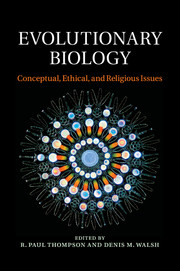Book contents
- Evolutionary Biology
- Evolutionary Biology
- Copyright page
- Dedication
- Contents
- Contributors
- Acknowledgments
- Introduction
- Chapter 1 Human evolution
- Part I Evolution and theology
- Part II Taxonomy and systematics
- Part III The structure of evolutionary theory
- Chapter 6 Darwin’s theory and the value of mathematical formalization
- Chapter 7 Population genetics, economic theory, and eugenics in R. A. Fisher
- Chapter 8 Exploring development and evolution on the tangled bank
- Part IV Function, adaptation, and design
- Index
Chapter 7 - Population genetics, economic theory, and eugenics in R. A. Fisher
from Part III - The structure of evolutionary theory
Published online by Cambridge University Press: 05 March 2014
- Evolutionary Biology
- Evolutionary Biology
- Copyright page
- Dedication
- Contents
- Contributors
- Acknowledgments
- Introduction
- Chapter 1 Human evolution
- Part I Evolution and theology
- Part II Taxonomy and systematics
- Part III The structure of evolutionary theory
- Chapter 6 Darwin’s theory and the value of mathematical formalization
- Chapter 7 Population genetics, economic theory, and eugenics in R. A. Fisher
- Chapter 8 Exploring development and evolution on the tangled bank
- Part IV Function, adaptation, and design
- Index
Summary
- Type
- Chapter
- Information
- Evolutionary BiologyConceptual, Ethical, and Religious Issues, pp. 137 - 150Publisher: Cambridge University PressPrint publication year: 2014
- 2
- Cited by



